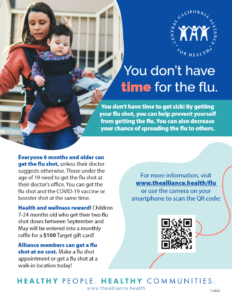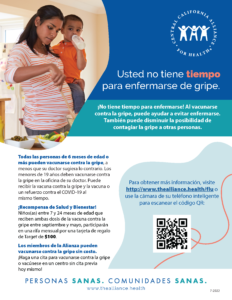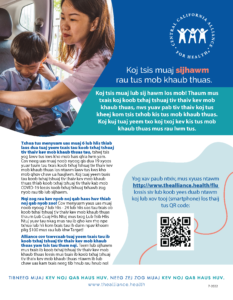It’s flu vaccine season!
The Alliance has launched its annual campaign to encourage Merced, Monterey and Santa Cruz County residents to get their flu vaccine. Please join us in encouraging Alliance members to get vaccinated. Flu vaccines are safe and easy to get, and they are available at no cost for Alliance members.
Where can Alliance members get flu vaccines?
Adults can get a flu vaccine at:
- A local pharmacy.
- A flu vaccine clinic.
- Their primary doctor’s office.
Children and adolescents under age 19 need to get the flu vaccine at their doctor’s office. Members can get a flu vaccine from a provider they are not currently linked to – no referral is needed. If members can’t get in to see their doctor, local health departments may also be offering flu vaccine clinics.
Alliance members with children ages 7 to 24 months who get their two flu vaccine doses between September and May will be entered into a monthly raffle for a $100 Target gift card.
2022-23 campaign
This year, the Alliance’s campaign theme is “You don’t have time for the flu,” emphasizing that amidst busy lives and on the heels of the pandemic, it is often inconvenient or impossible to take time off for illnesses.
More information for members is available at www.thealliance.health/flu.
We also have a flu vaccine flyer available in English, Spanish and Hmong. Please print and distribute to Alliance members as you see fit.
Flu + COVID-19 vaccines
When patients come in to get the flu vaccine, it’s also a great opportunity to encourage them to get the COVID-19 vaccine and any other vaccines due. For more information and answers to patient FAQs regarding seasonal flu and COVID-19, visit the CDC website.
Test to Treat grant for providers serving pediatric populations
The State of California is offering $10 million in grants to support providers who are vaccinating infants and toddlers against COVID-19. The grant is funded by the California Department of Public Health and administered by Physicians for a Healthy California.
Grants are intended to support providers in becoming community COVID-19 vaccinators and expanding vaccination location hours.
Funding opportunities include:
- Up to $35,000 per site for providers newly enrolled in myCAvax.
- Up to $25,000 per site for providers already enrolled in myCAvax.
The deadline to apply is October 14, 2022. Funding will be given on a first come, first-served basis.
To learn more about eligibility and the application process, review the KidsVaxGrant 2.0 Grant Guidelines. To apply, visit the Physicians for a Healthy California website.
New coverage requirements for biomarker testing
Effective July 1, 2022, there are new coverage requirements for biomarker testing for applicable members diagnosed with cancer.
“Biomarker test” is defined as a diagnostic test (single or multigene) of an individual’s biospecimen, such as tissue, blood, or other bodily fluids, for DNA or RNA alterations, including phenotypic characteristics of a malignancy. The test’s purpose is to identify an individual with a subtype of cancer in order to guide treatment.
The Alliance covers medically necessary biomarker testing for members with:
- Advanced or metastatic stage 3 or 4 cancer.
- Cancer progression or recurrence in the member with advanced or metastatic stage 3 or 4 cancer.
Prior authorization is not required for biomarker testing that is associated with an FDA-approved therapy for advanced or metastatic stage 3 or 4 cancer.
For more information, read DHCS APL 22-010 – Cancer Biomarker Testing.
Register for September Care-Based Incentive Workshop
Registration is now open for the Alliance’s 2023 Care-Based Incentive (CBI) Workshop Webinar. The webinar will be held Sept. 14, noon-1:30 p.m., covering information on:
- New and updated CBI programmatic, FFS and exploratory measures like the new $200 Fee-For-Service Measure for Adverse Childhood Experiences (ACEs) Training and Attestation.
- Effective communication tools.
- Alliance resources.
Who should attend:
- Primary care providers.
- Medical assistants.
- Front office and billing staff, office managers.
To learn more and register, please visit the event registration page or contact a Provider Relations Representative at 800-700-3874, ext. 5504.
You can also find more information about the CBI program on our website.
Click the Register button above or contact a Provider Relations Representative at 800-700-3874, ext. 5504.
Annual Provider Appointment Availability Survey
Every year, the Alliance administers the Provider Appointment Availability Survey (PAAS) to assess our network’s ability to provide care within timely access standards. We recognize the many challenges faced by providers throughout the pandemic, and that access to care has been heavily impacted by factors related to COVID-19. We are committed to conducting outreach that is as minimally impactful as possible to the daily operations of your office.
In addition, we recognize the different modalities of care utilized by providers this year, including telephonic appointments. Please note that telehealth appointments do demonstrate the means to provide timely access to care and should be included in your responses, if available.
To help set your office up for success, we have also included a brief list of timely access best practices in the information below.
Thank you for your participation and for your collaboration in providing accessible, quality health care to Alliance members!
Survey timing
The Alliance will be launching the PAAS in late August.
Survey format
- You will initially receive the survey by email.
- If no response is received within 5 business days, you will receive the survey by phone.
Please encourage your reception staff to participate in survey calls. You may receive requests from multiple health plans to complete the PAAS.
Timely access guidelines
Specific guidelines for timely access to care are outlined in:
- Alliance Policy 401-1509 – Timely Access to Care
- Alliance Policy 300-8030 – Monitoring Network Compliance with Accessibility Standards
Both policies can be found in the Alliance Provider Manual.
Timely access standards monitored through the PAAS include the following:
| Urgent Care Appointments | Wait Times |
| Services that do not require prior authorization | 48 hours |
| Specialty services that require prior authorization | 96 hours |
| Non-Urgent Care Appointments | Wait Times |
| Primary care (including first prenatal and preventive visits) | 10 business days |
| Mental health care appointment (with a non-physician provider) | 10 business days |
| Follow up appointment with a mental health care (non-physician) provider or substance use disorder provider | 10 business days from the prior appointment |
| Specialist appointments (including psychiatry) | 15 business days |
| Physical therapy or mammography appointment for the diagnosis or treatment of injury, illness or other health condition | 15 business days |
Thank you for your participation in this year’s PAAS. If you have questions, please contact an Alliance Provider Relations representative at 800-700-3874, ext. 5504.
Timely access best practices
Scheduling guidelines
- Maintain a waitlist for same-day or next-day appointments and fill appointments as cancellations occur. Some clinics integrate the wait list into the Electronic Medical Records (EMR).
- Implement same-day confirmation calls a few hours before the appointment to avoid no-shows and schedule waitlist patients as appointments open up.
- Block up to four appointments in the morning and afternoon on each provider’s schedule to accommodate same-day requests.
- Assign RN or LVN staff to phone triage patients to ensure appropriate scheduling of same-day appointments.
- Consider rotating provider shifts to see walk-in, overflow or waitlist patients.
- Make use of informative hold messages that include:
- After-hours on-call providers.
- The Alliance’s Nurse Advice Line (NAL).
- Triage availability during business hours.
Flexibility is key
- Offer extended office hours on certain days to accommodate same-day and waitlist patients.
- If a patient arrives early, consider seeing them upon arrival, potentially freeing up an appointment slot for a waitlist patient.
- Consider double-booking patients with a history of no-shows.
- If a clinic has multiple sites and the patient is able to commute, refer to providers with last-minute appointments at other sites.
Educate and organize
- Provide receptionists with timely access standards in training materials and follow up with reminders on a regular basis.
- Motivate staff to ensure patients are scheduled as soon as possible, whenever possible.
- Assign each reception employee specific roles (checking in, checking out, phone calls, etc.).





